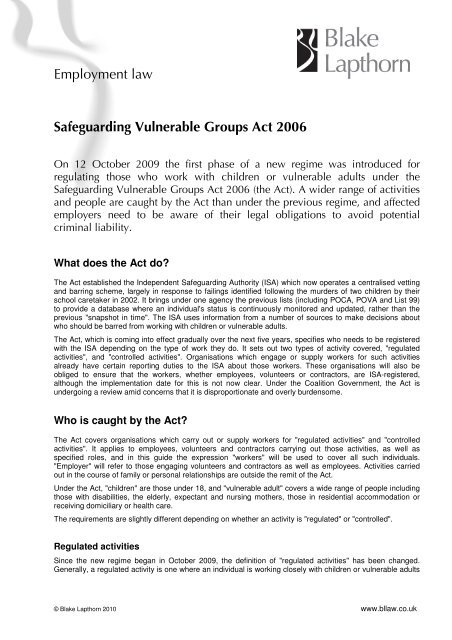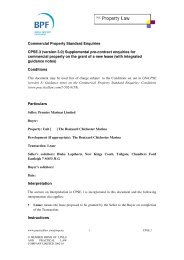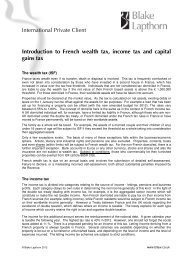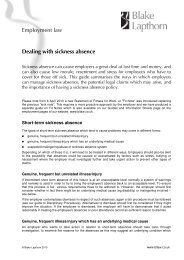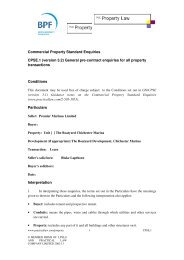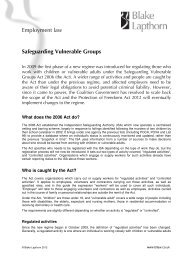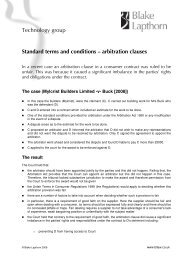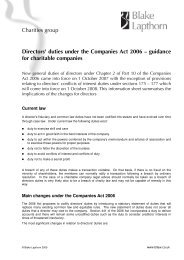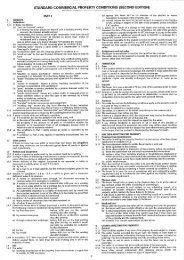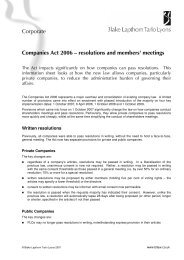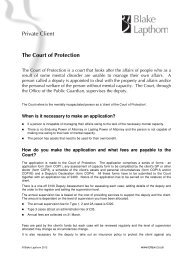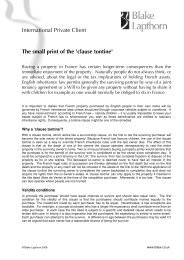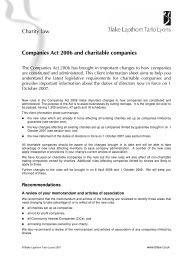Safeguarding Vulnerable Groups Act 2006 - Blake Lapthorn
Safeguarding Vulnerable Groups Act 2006 - Blake Lapthorn
Safeguarding Vulnerable Groups Act 2006 - Blake Lapthorn
- No tags were found...
Create successful ePaper yourself
Turn your PDF publications into a flip-book with our unique Google optimized e-Paper software.
Employment law<strong>Safeguarding</strong> <strong>Vulnerable</strong> <strong>Groups</strong> <strong>Act</strong> <strong>2006</strong>On 12 October 2009 the first phase of a new regime was introduced forregulating those who work with children or vulnerable adults under the<strong>Safeguarding</strong> <strong>Vulnerable</strong> <strong>Groups</strong> <strong>Act</strong> <strong>2006</strong> (the <strong>Act</strong>). A wider range of activitiesand people are caught by the <strong>Act</strong> than under the previous regime, and affectedemployers need to be aware of their legal obligations to avoid potentialcriminal liability.What does the <strong>Act</strong> do?The <strong>Act</strong> established the Independent <strong>Safeguarding</strong> Authority (ISA) which now operates a centralised vettingand barring scheme, largely in response to failings identified following the murders of two children by theirschool caretaker in 2002. It brings under one agency the previous lists (including POCA, POVA and List 99)to provide a database where an individual's status is continuously monitored and updated, rather than theprevious "snapshot in time". The ISA uses information from a number of sources to make decisions aboutwho should be barred from working with children or vulnerable adults.The <strong>Act</strong>, which is coming into effect gradually over the next five years, specifies who needs to be registeredwith the ISA depending on the type of work they do. It sets out two types of activity covered, "regulatedactivities", and "controlled activities". Organisations which engage or supply workers for such activitiesalready have certain reporting duties to the ISA about those workers. These organisations will also beobliged to ensure that the workers, whether employees, volunteers or contractors, are ISA-registered,although the implementation date for this is not now clear. Under the Coalition Government, the <strong>Act</strong> isundergoing a review amid concerns that it is disproportionate and overly burdensome.Who is caught by the <strong>Act</strong>?The <strong>Act</strong> covers organisations which carry out or supply workers for "regulated activities" and "controlledactivities". It applies to employees, volunteers and contractors carrying out those activities, as well asspecified roles, and in this guide the expression "workers" will be used to cover all such individuals."Employer" will refer to those engaging volunteers and contractors as well as employees. <strong>Act</strong>ivities carriedout in the course of family or personal relationships are outside the remit of the <strong>Act</strong>.Under the <strong>Act</strong>, "children" are those under 18, and "vulnerable adult" covers a wide range of people includingthose with disabilities, the elderly, expectant and nursing mothers, those in residential accommodation orreceiving domiciliary or health care.The requirements are slightly different depending on whether an activity is "regulated" or "controlled".Regulated activitiesSince the new regime began in October 2009, the definition of "regulated activities" has been changed.Generally, a regulated activity is one where an individual is working closely with children or vulnerable adults© <strong>Blake</strong> <strong>Lapthorn</strong> 2010 www.bllaw.co.uk
(either paid or unpaid) on a frequent, intensive and/or overnight basis which is not part of a family orpersonal arrangement.A regulated activity is 'frequent' if it occurs once a week or more; 'intensive' if it is for more than 3 days in any30 day period and/or overnight between the hours of 2am and 6am.'Regulated activity' includes:specified activities such as teaching, training, care or supervision, advising, treatment or therapy,moderating chatroom/internet services, transportation of children or vulnerable adults)activities carried out in a particular place (eg education establishments, nurseries, children's homes, carehomes) by the same person 'frequently', or 'intensively'. If their work is 'frequent or 'intensive' this mayinclude catering, cleaning, administrative and maintenance staff if they come into contact with children orvulnerable adults.fostering and childmindingactivities carried out by those in positions of trust (eg school governors, trustees of charities for childrenor vulnerable adults, inspectors of schools, chief inspector of prisons etc)Employers engaging workers or volunteers in regulated activities are under a duty to refer information to theISA in certain circumstances (see further below) and there are also various criminal offences under the <strong>Act</strong>.Criminal offences for regulated activitiesA person is "barred" from carrying out a regulated activity if he/she is included in one of the barred lists atSchedule 3 of the <strong>Act</strong>. The lists include those whose conduct has endangered, harmed (or puts achild/vulnerable adult at risk of harm) or involves indecent sexual material of children.A barred person cannot engage in regulated activity – even if it is not done frequently, or for more than threedays in any 30 day period, or overnight. As well as it being a criminal offence to do so by the worker, it willalso be a criminal offence for an employer or personnel supplier to:permit a barred worker to engage in regulated activity (subject to limited defences) where they know orhave reason to believe that the worker is barred, punishable by up to five years' imprisonment and/or afinepermit a worker not yet registered with the ISA to engage in regulated activity where they know or havereason to believe that the worker is not registered, punishable by a fine of up to £5,000fail to check whether the worker is ISA-registered and their ISA status, punishable by a fine of up to£5,000 (separate checking requirements apply to personnel suppliers). You cannot employ someone(even temporarily) until the check has been made, meaning that employment must be put off until then.This could have a significant effect on organisations obliged to comply with certain worker-to-serviceuser ratios, such as nurseriesThe first offence came into effect on 12 October 2009. The last two offences are being phased in graduallyso that it does not initially apply to those already in post before this offence comes into effect. It wasenvisaged that new appointments would be subject to these last two provisions from November 2010.However the <strong>Act</strong> is now undergoing a review by the Coalition Government and the ISA registration schemehas been halted pending this review. If phased registration goes ahead and is eventually applied to thosealready in post, it is estimated that some 11 million workers will need to be ISA-registered.Domestic employeesA barred individual cannot take part in a regulated activity in domestic circumstances. Those who employdomestic workers, such as housekeepers, private tutors and care workers in their own home will not beobliged to check that the worker is ISA registered, but are able to do so if they have the worker's consent.Controlled activities© <strong>Blake</strong> <strong>Lapthorn</strong> 2010 2
Controlled activities are those that do not constitute a regulated activity and are essentially those done bysupport workers (such as cleaners, caretakers, shop workers, catering staff) in the NHS, further education,adult social care and health settings. It also includes those working for specified organisations (eg localauthority) with frequent access to sensitive records.A barred worker can sometimes engage in controlled activity if sufficient safeguards are put in place.Employers are, however, under a duty to refer workers carrying out controlled activities to the ISA in certaincircumstances, (see below).What happens to CRB checks?The requirement to check a worker's ISA status does not replace the need for CRB (Criminal RecordsBureau) checks for posts that require it. However, where a worker is to work in regulated activity, a StandardCRB check is no longer available and an Enhanced CRB check must be made. The CRB will work inpartnership with the ISA to administer the checks. Employers should carefully consider when it is appropriateor required to make checks for the post, and how they should respond to any issues that are raised by adisclosure.What is the duty to refer and how has it changed?Certain employers have a statutory duty to refer workers who have ceased to work for them because theyhave harmed a child or vulnerable adult, or placed them at risk of harm. Prior to 20 January 2009 this wasdone to different government departments. All such referrals are now to the ISA (except misconduct referralson teachers which are not child-protection related, which is done to the GTC).From 12 October 2009, more employers will be placed under the duty to refer information to the ISAaccording to whether or not they are a regulated activity provider or a controlled activity provider, not justthose with existing statutory duties.Who has a duty to refer?The duty to refer information to the ISA under the <strong>Act</strong> applies to:adult/child protection teams in local authoritiesnamed professional bodies and supervisory authoritiesemployers and service providers of regulated and controlled activitypersonnel suppliers such as employment agencies, employment business and education institutionsOther employers of those working with children and/or vulnerable adults, as well as parents or domesticemployers may refer relevant information but are not under an obligation to do so.When is the duty to refer engaged?The duty to refer is engaged when, for a reason relating to harm or potential harm of a child or vulnerableadult by a worker, an employer withdraws permission for that worker to carry out the activity, or the employerwould or might have done so if the worker had not otherwise stopped carrying out the activity. So this willgenerally mean when a worker:has their services terminatedis dismissedresigns or leavesis transferred to other duties or another job which does not involve carrying out that activityis off sick and has not returned to work© <strong>Blake</strong> <strong>Lapthorn</strong> 2010 3
and the employer thinks that the worker has harmed or may harm a child or vulnerable adult, has engaged in'relevant conduct', or has committed an offence which would lead them to be automatically barred (asspecified in regulations).As well as general harm or potential for harm, 'relevant conduct' includes specific types of conduct eg childpornography or violent pornography. Employers who have any concerns about a worker's conduct withchildren or vulnerable adults should check whether their concerns must be referred to the ISA under the <strong>Act</strong>.Similar requirements apply where for the same reasons a personnel supplier becomes aware ofcircumstances outlined above, or decides to stop acting for the worker, or might have done so if thearrangement with the worker had not otherwise come to an end.Relevant information should be referred to the ISA as soon as it becomes available.Employers and personnel suppliers are also under a duty to provide information to the ISA where requested,for example where ISA is considering whether to include someone on a barred list or remove them from it.Failure to comply without reasonable excuse is a criminal offence.What information should be referred?Regulations specify the exact information that must be provided to the ISA where there is a concern aboutharm or risk of harm to children or vulnerable adults. It includes information such as:application forms, offer letters and job descriptionsemployment history, disciplinary record, training records,information about the conduct concerned and the worker's response or explanation to any allegationsdetails of investigations and disciplinary proceedings including information about any child or vulnerableadult potentially placed at risk of harmThe Regulations also specify the information that must be provided by personnel suppliers.<strong>Act</strong>ion pointsConsider whether your organisation might be caught by the <strong>Act</strong> – seek our advice if you are not sure.Ensure you have robust recruitment procedures, references are taken up and you fully understand whyjob applicants left any previous employment – now doubly important because there is no mechanism for"provisional listing" as there was under POCA and POVA.Review and amend offer letters and contracts. Immediate consideration should be given to making anoffer of employment conditional on the worker confirming that they are not barred, because employing abarred worker (knowingly, or where there is reason to believe they are barred) has been an offencesince 12 October 2009. Going forward, and dependant on the outcome of the Government's review, theoffer of employment must also be conditional on the worker being ISA-registered, not being barred(unless only "controlled activity" is involved), and no issues being raised by the ISA check. Contractsalso need to provide that changes to a worker's ISA status during the course of the engagement aregrounds for disciplinary/dismissal action or termination of the engagement.Keep an eye on the roles workers are undertaking – watch for ones changing into regulated activities. For existing workers, consider who will pay for ISA registration. The onus is on workers to pay for it (£64– free for volunteers) but some employers may want to cover this cost.Keep up to date with the outcome of the Government's review and any changes to the vetting andbarring scheme that are made as a result of it.Ensure you understand in what circumstances you have a duty to refer information to the ISA and how todo so – particularly if you did not have such a duty previously. This is a sensitive area which could giverise to grievances and breach of contract claims, and should be approached with care.© <strong>Blake</strong> <strong>Lapthorn</strong> 2010 4
Be aware that as a result of recent case law, employees facing disciplinary hearings which might affecttheir ability to be re-employed (eg where referral to ISA might result in them being barred) may ask to beaccompanied by a lawyer. Please seek our advice where such a request is received.ContactFor further information or advice, please contact:Sarah PeacockE: sarah.peacock@bllaw.co.ukEmma DrewE: emma.drew@bllaw.co.ukT: 023 8085 7454T: 023 8085 7436This publication is not a substitute for detailed advice on specific transactions and problems and should not be taken as providing legaladvice on any of the topics discussed.<strong>Blake</strong> <strong>Lapthorn</strong> uses the information it holds about you to contact you where necessary if (for instance) you have registered to attend aseminar that we are hosting or have requested information regarding the services that we provide. We will also use it to administer,support, improve and develop our business and to contact you for your views on our services, as well as to let you know about otherproducts and services which we offer which may be of interest to you. We may send them by post, telephone or fax, email or SMS. Ifyou would rather NOT receive further information by any particular format, or at all, or if your details need updating, please contact JinaPatel on 020 7814 5449 or by email at jina.patel@bllaw.co.ukWe will not disclose any of your personal identifiable information to any third parties without your express permission to do so, unlesswe believe that we should do so to comply with the law.© <strong>Blake</strong> <strong>Lapthorn</strong> 2010 5


